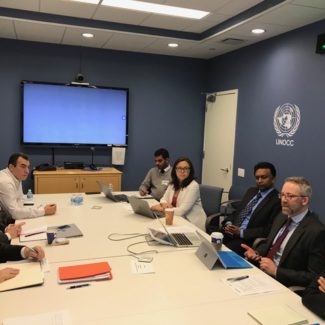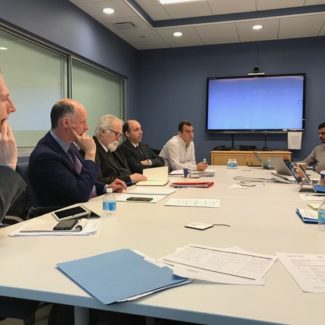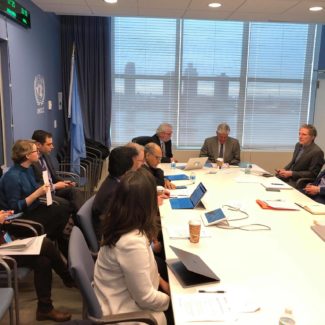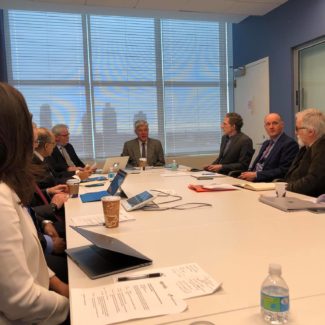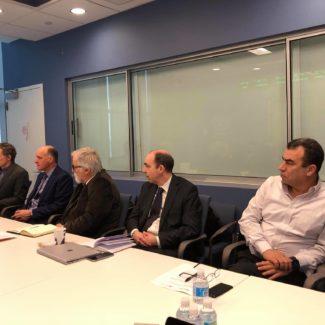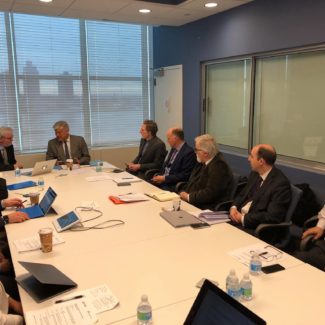Download the 2017/2018 UN Crisis Information Management stock-taking report here.
On 26 February 2018, the ICT4Peace Foundation facilitated a meeting with key UN agencies and departments at the UN Secretariat in New York, on crisis information management. Colleagues from the UN system in Geneva joined via teleconference. The meeting, co-chaired by Ambassador Daniel Stauffacher and ASG Fabrizio Hochschild, followed several months of intensive interactions with the UN to do a rapid stocktaking on capacities and capabilities around crisis information management. This process involved face to face meetings as well as an online questionnaire. The questionnaire aimed to get respondents, mostly from the Crisis Information Management Advisory Group (CiMAG) to reflect on the CIM framework which had four major components: information architecture, technology development, stakeholder management, and capacity building. These pillars were supposed to influence governance, funding, evaluation and incrementalism in the crisis information management domain. This stock-taking exercise, like the one carried out by ICT4Peace in 2008 was designed and lead by Sanjana Hattotuwa, Special Advisor, ICT4Peace Foundation.
In 2008, invited by the UN Chief Information Technology Officer, ICT4Peace undertook a similar stocktaking exercise of UN Crisis Information Management Activities, Capabilities and Best- Practice. All of the organizations in the Chief Executive’s Board participated in the stocktaking exercise, including all of the UN Agencies, Funds and Programmes, the Departments of the UN Secretariat, and other members of the broader UN System.See the report here.
In the Status of implementation of the information and communications technology strategy for the United Nations Secretariat, A report of the Secretary-General from 2010 (A/65/491), it is noted that the Crisis Information Management Strategy is based on the recognition that the United Nations, its Member States, constituent agencies and non-governmental organizations need to improve such information management capacity in the identification, prevention, mitigation, response and recovery of all types of crises, natural as well as man- made. The strategy will leverage and enhance this capacity and provide mechanisms to integrate and share information across the United Nations system.
The ICT4Peace Foundation facilitated annual retreats of the Crisis Information Management Advisory Group (CiMAG) from 2008 to 2016, with the support of the Governments of Switzerland and Sweden.
In 2018, there is a broad recognition that a historic, unique opportunity under the leadership of the incumbent UN SG and senior level staff now exists to push forward the core tenets of the Crisis Information Management Strategy, which are deeply resonant with the essential elements of frontier issues, UN reform and IM writ large.
The meeting in February in New York followed one in December, also facilitated by the ICT4Peace Foundation, that discussed preliminary findings of interactions with UN colleagues around the state of play regarding crisis information management. Many at the time emphasised Artificial Intelligence (AI), Machine Learning (ML), predictive analytics / business intelligence (BI), and an interest in the Internet of Things (IoT) / sensor-based networks as key opportunities and threats to IM in particular, and the mandate of the UN in general. UN staff flagged significant investments in inter and intra-agency dashboard, business analytics, incident monitoring and responses systems. Challenges remain in a number of significant areas including staffing, inability of UN to attract and retain talented staff due to outmoded and outdated human resource policies. Human capacity constraints and core budgetary allocations were repeatedly mentioned as challenges in the more systemic implementation of CiM strategies across the UN. The CiMAG annual meeting was repeatedly flagged as the one time the UN family, talked amongst themselves and shared information around IM.
On the 26th of February, ASG Hochschild addressed these points and many more, from the perspective of senior leadership at the UN that was committed to the underlying principles of the CiM strategy.
The Foundation proposed that the group meets again in June to review progress, and under the leadership of ASG Hochschild, take forward key recommendations drawn up by the CiM Advisory Group moving ahead, consonant with the UN’s own measures, both under consideration and already taken, to strengthen the effectiveness and efficiency of the institution in dealing with crises.
All the documents and public facing output from the CiM process since 2008 are captured here.

